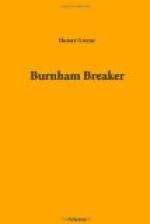He turned his steps in the direction of Sharpman’s office, reached it finally, went up the little walk, tried to open the door, and found it locked. The lights were out, the lawyer had gone. Ralph was very tired, and he sat down on the door-step to rest and to try to think. He felt that he had made every effort to find Rhyming Joe and had failed. To-morrow the man would be gone. Sharpman would go to Wilkesbarre. The evidence in the Burnham case would be closed. The jury would come into court and declare that he, Ralph, was Robert Burnham’s son—and it would be all a lie. Oh, no! he could not let that be done. His whole moral nature cried out against it. He must see Sharpman to-night and beg him to put a stop to so unjust a cause. To-morrow it might be too late. He rose and started down the walk to find the lawyer’s dwelling. But he did not know in which direction to turn. A man was passing along the street, and Ralph accosted him:—
“Please, can you tell me where Mr. Sharpman lives?” he asked.
“I don’t know anything about him,” replied the man gruffly, starting on.
In a minute another man came by, and Ralph repeated his question.
“I don’t know where he does live, sonny,” said the man, “but I know where he would live if I had my choice as to his dwelling-place; he’d reside in the county jail,” and this man, too, passed on.
Ralph went back and sat down on the steps again.
The sky had become covered with clouds, no stars were visible, and it was very dark.
What was to be done now? He had failed to find Rhyming Joe, he had failed to find Lawyer Sharpman. The early morning train would carry both of them beyond his reach. Suppose it should? Suppose the case at Wilkesbarre should go on to its predicted end, and the jury should bring in their expected verdict, what then?
Why, then the law would declare him to be Robert Burnham’s son; the title, the position, the fortune would all be his; Mrs. Burnham would take him to her home, and lavish love and care upon him; all this unless—unless he should tell what he had heard. Ah! there was a thought. Suppose he should not tell, suppose he should let the case go on just as though he had not known the truth, just as though he had stayed at home that night instead of coming to the city; who would ever be the wiser? who would ever suspect him of knowing that the verdict was unjust? He might yet have it all, all, if only he would hold his tongue. His heart beat wildly with the thought, his breath came in gasps, something in his throat seemed choking him. But that would be wrong—he knew it would be wrong, and wicked; a sense of shame came over him, and he cast the tempting thought aside.
No, there was but one thing for him, as an honest boy, to do, and that was to tell what he had heard.
If he could tell it soon enough to hold the verdict back, so much the better, if he could not, still he had no right to keep his knowledge to himself—the story must be known. And then farewell to all his hopes, his plans, his high ambition. No beautiful home for him now, no loving mother nor winsome sister nor taste of any joy that he had thought to know. It was hard to give them up, it was terrible, but it must be done.




